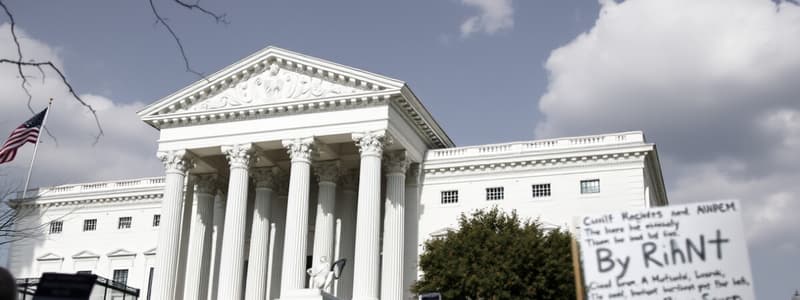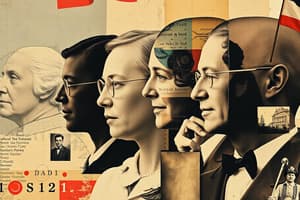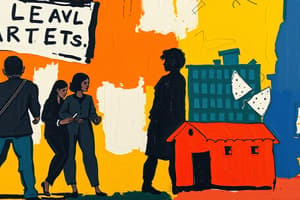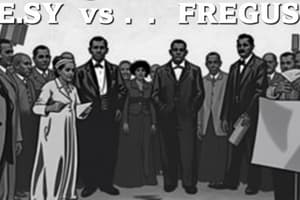Podcast
Questions and Answers
What did the Civil Rights Act of 1875 do?
What did the Civil Rights Act of 1875 do?
Outlawed segregation in public facilities by decreeing that 'all persons shall be entitled to full and equal enjoyment of the accommodation.'
How did the court rule in Plessy?
How did the court rule in Plessy?
The 'separate but equal' law did not violate the Fourteenth Amendment.
In what three ways did WWII help set the stage for the modern civil rights movement?
In what three ways did WWII help set the stage for the modern civil rights movement?
A. The demand for soldiers created a shortage of white male laborers. B. One million African Americans served in the armed forces and ended discriminatory policies. C. Civil rights organizations actively campaigned for African American voting rights and challenged Jim Crow laws.
Who argued Brown's case?
Who argued Brown's case?
What did the Brown ruling declare?
What did the Brown ruling declare?
What organization was formed to support Rosa Parks?
What organization was formed to support Rosa Parks?
What did the Montgomery Improvement Association do?
What did the Montgomery Improvement Association do?
How did President Eisenhower respond to the Little Rock Nine?
How did President Eisenhower respond to the Little Rock Nine?
Who was the president of SCLC (Southern Christian Leadership Conference)?
Who was the president of SCLC (Southern Christian Leadership Conference)?
What was SCLC's purpose?
What was SCLC's purpose?
What did SNCC accomplish, and how?
What did SNCC accomplish, and how?
The effort to register African Americans in the South was known as?
The effort to register African Americans in the South was known as?
The Voting Rights Act of 1965 eliminated the so-called ____ which disqualified many African American voters in the past.
The Voting Rights Act of 1965 eliminated the so-called ____ which disqualified many African American voters in the past.
One of the most prominent voices of the Black Power movement was?
One of the most prominent voices of the Black Power movement was?
Appointed by President Johnson to study the case of urban violence, which blamed much of the problem on white racism was?
Appointed by President Johnson to study the case of urban violence, which blamed much of the problem on white racism was?
In the case Brown v. Board of Education of Topeka, the Supreme Court struck down what as unconstitutional?
In the case Brown v. Board of Education of Topeka, the Supreme Court struck down what as unconstitutional?
Eisenhower placed the Arkansas National Guard under federal control and ordered troops into Little Rock to protect African American students trying to desegregate the school.
Eisenhower placed the Arkansas National Guard under federal control and ordered troops into Little Rock to protect African American students trying to desegregate the school.
The Civil Rights Act of 1957 was the first piece of civil rights legislation since the Reconstruction that gave the Attorney General greater power over school desegregation and gave the federal government jurisdiction over violations of African American voting rights.
The Civil Rights Act of 1957 was the first piece of civil rights legislation since the Reconstruction that gave the Attorney General greater power over school desegregation and gave the federal government jurisdiction over violations of African American voting rights.
The civil rights leader who preached that blacks should be separate from white society was?
The civil rights leader who preached that blacks should be separate from white society was?
Martin Luther King Jr. believed that racial injustice should be fought using non-violent resistance and civil disobedience.
Martin Luther King Jr. believed that racial injustice should be fought using non-violent resistance and civil disobedience.
The March on Birmingham convinced President Eisenhower that only a new civil rights act could end racial violence.
The March on Birmingham convinced President Eisenhower that only a new civil rights act could end racial violence.
The 26th Amendment outlawed the poll tax, which was a measure used to keep African Americans from voting.
The 26th Amendment outlawed the poll tax, which was a measure used to keep African Americans from voting.
The March on Selma prompted President Johnson to push for swift passage of a Voting Rights Act.
The March on Selma prompted President Johnson to push for swift passage of a Voting Rights Act.
The Kerner Commission blamed much of the rioting that plagued northern cities during the mid-60s on?
The Kerner Commission blamed much of the rioting that plagued northern cities during the mid-60s on?
The Civil Rights Act of 1968 ended discrimination in?
The Civil Rights Act of 1968 ended discrimination in?
The nation experienced the worst urban rioting in its history in the days following the assassination of?
The nation experienced the worst urban rioting in its history in the days following the assassination of?
Civil rights leaders criticized the fact that much of the money for President Johnson's War on Poverty had been redirected to help fund?
Civil rights leaders criticized the fact that much of the money for President Johnson's War on Poverty had been redirected to help fund?
Between 1965 and 1992, the number of African Americans holding elected office?
Between 1965 and 1992, the number of African Americans holding elected office?
Flashcards are hidden until you start studying
Study Notes
Civil Rights Act of 1875
- Outlawed segregation in public facilities, ensuring full equality for all individuals.
- Declared unconstitutional by the Supreme Court in 1883.
Plessy v. Ferguson
- Established the "separate but equal" doctrine, allowing segregation under the pretext of equality.
- Ruled that segregation did not violate the Fourteenth Amendment regarding equal treatment.
WWII and Civil Rights Movement
- Increased demand for labor created opportunities for African Americans, leading to workforce shifts.
- Approximately one million African Americans served in the armed forces, prompting changes in discriminatory policies.
- Civil rights organizations actively promoted voting rights and challenged Jim Crow laws during the war.
Thurgood Marshall
- Argued the landmark case of Brown v. Board of Education, advocating for desegregation in schools.
Brown v. Board of Education
- Supreme Court ruling that declared segregation in public schools unconstitutional.
Montgomery Improvement Association
- Formed in response to Rosa Parks' arrest.
- Organized the Montgomery Bus Boycott, a significant act of civil disobedience.
Little Rock Nine
- President Eisenhower intervened to protect African American students attempting to integrate Central High School by deploying federal troops.
Southern Christian Leadership Conference (SCLC)
- Led by Martin Luther King Jr.
- Aimed to engage in nonviolent activism against racial discrimination and second-class citizenship.
Student Nonviolent Coordinating Committee (SNCC)
- Focused on awareness-raising through peaceful protests, including sit-ins to challenge segregation.
Freedom Summer
- Effort aimed at encouraging African American voter registration in the South.
Voting Rights Act of 1965
- Abolished literacy tests that had been used to disqualify African American voters.
Black Power Movement
- Prominent figure Stokely Carmichael advocated for Black empowerment and racial pride.
Kerner Commission
- Established by President Johnson to investigate causes of urban violence, attributing much of the unrest to white racism.
Impact of Brown v. Board of Education
- Supreme Court ruling deemed segregation in public schools unconstitutional, leading to significant legal reforms.
Eisenhower and Little Rock
- True: Eisenhower placed the Arkansas National Guard under federal control to ensure the safety of African American students.
Civil Rights Act of 1957
- First civil rights legislation since Reconstruction, enhancing the Attorney General's authority over school desegregation and violations of voting rights.
Malcolm X
- Advocated for separation of Black Americans from white society and promoted a more militant approach to civil rights.
Martin Luther King Jr.'s Philosophy
- True: King championed nonviolent resistance and civil disobedience in combating racial injustice.
March on Birmingham
- False: Did not convince Eisenhower to support a new civil rights act.
Poll Tax and 26th Amendment
- False: The 26th Amendment concerns voting age, not the outlawing of poll taxes.
March on Selma
- True: Prompted President Johnson to advocate for the swift passage of the Voting Rights Act.
Kerner Commission's Findings
- Blamed much of the urban rioting in the 1960s on systemic white racism.
Civil Rights Act of 1968
- Banned housing discrimination, further advancing civil rights protections.
Urban Riots Post-King's Assassination
- Resulted in widespread urban unrest following the assassination of Martin Luther King Jr.
War on Poverty vs. Vietnam War
- Civil rights leaders criticized the redirection of resources from anti-poverty programs to fund the Vietnam War.
African Americans in Elected Office
- Steady increase in the number of African Americans holding public office from 1965 to 1992.
Studying That Suits You
Use AI to generate personalized quizzes and flashcards to suit your learning preferences.




